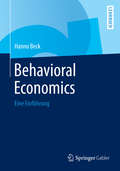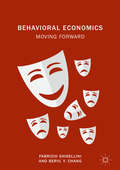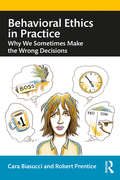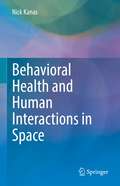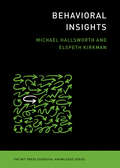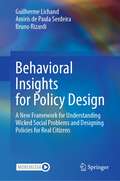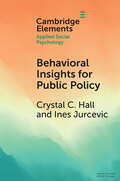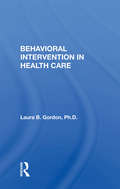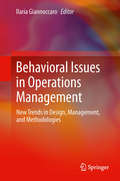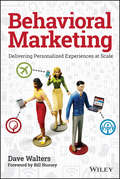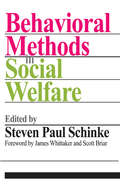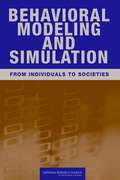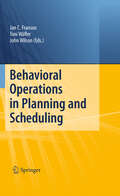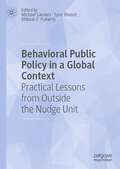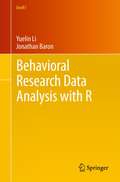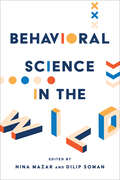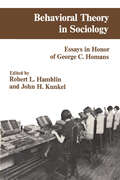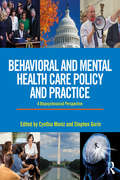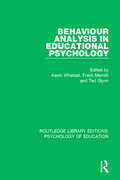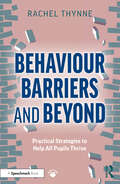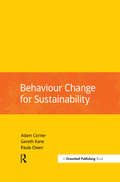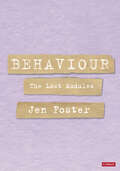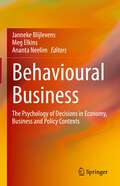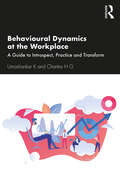- Table View
- List View
Behavioral Economics: Eine Einführung
by Hanno BeckSeit den siebziger Jahren haben die Erkenntnisse und Forschungen der Psychologie auch Einzug in die Wirtschaftswissenschaften gehalten – sie sollen das Menschenbild der Ökonomen und ihre Modelle realistischer machen. Dieses Buch beschreibt die wichtigsten Methoden, Konzepte und Erkenntnisse der verhaltenswissenschaftlichen Ökonomik (Behavioral Economics) und weitere dazugehörige Forschungsgebiete wie Glücksforschung, Fairness und Neuroökonomie. Das Lehrbuch stellt die wichtigsten theoretischen und empirischen Befunde und Ideen vor, um sie anschließend einer kritischen Würdigung zu unterziehen. Es ist sowohl für Studierende geeignet als auch für Dozenten und Wissenschaftler, die sich über den aktuellen Forschungsstand der Disziplin informieren wollen.
Behavioral Economics: Moving Forward
by Fabrizio Ghisellini Beryl Y. ChangThis book sets the agenda to turn behavioral economics, which has long been considered a subordinate discipline, into mainstream economics. Ghisellini and Chang expose the conceptual and empirical inadequacy of conventional economics using illustrations of real world decision-making in a dynamic environment, including evidence from the global financial crisis. With a rigorous yet accessible style, they give a comprehensive overview of behavioral economics and of the current state of play in the field across different schools of thought. Seven major conceptual problems still affecting the development of behavioral economics are identified and the authors propose research avenues to address these issues and allow the discipline to receive its long-awaited recognition.Crucial reading for researchers and students looking for insights into the many unsolved problems of economics.
Behavioral Ethics in Practice: Why We Sometimes Make the Wrong Decisions
by Cara Biasucci Robert PrenticeThis book is an accessible, research-based introduction to behavioral ethics. Often ethics education is incomplete because it ignores how and why people make moral decisions. But using exciting new research from fields such as behavioural psychology, cognitive science, and evolutionary biology, the study of behavioural ethics uncovers the common reasons why good people often screw up. Scientists have long studied the ways human beings make decisions, but only recently have researchers begun to focus specifically on ethical decision making. Unlike philosophy and religion, which aim to tell people how to think and act about various moral issues, behavioral ethics research reveals the factors that influence how people really make moral decisions. Most people get into ethical trouble for doing obviously wrong things. Aristotle cannot help, but learning about behavioral ethics can. By supplementing traditional approaches to teaching ethics with a clear, detailed, research-based introduction to behavioral ethics, beginners can quickly become familiar with the important elements of this new field. This book includes the bonus of being coordinated with Ethics Unwrapped – a free, online, educational resource featuring award-winning videos and teaching materials on a variety of behavioral ethics (and general ethics) topics. This book is a useful supplement for virtually every ethics course, and important in any course where incorporating practical ethics in an engaging manner is paramount. The content applies to every discipline –business ethics, journalism, medicine, legal ethics, and others – because its chief subject is the nature of moral decision making. The book is also highly relevant to practitioners across all sectors.
Behavioral Health and Human Interactions in Space
by Nick KanasThis textbook covers the range of psychological and interpersonal issues that can affect astronauts living and working in space. It deals with the three major risk areas cited by NASA’s Behavioral Health and Performance Element: Behavioral Medicine, Team Risk, and Sleep Risk. Based on the author’s more than 50 years of experience in space-related activities writing, conducting research, and teaching undergraduate and graduate courses, the book follows a comprehensive range of topics that include: cognitive effects; psychiatric issues; cultural influences; salutogenic and positive aspects of space travel; autonomy and delayed communication; current plans to return to the Moon and Mars; analysis of study environments such as the polar regions, submersible habitats, and space simulation facilities; and more. It draws on research, literature, and case studies from the 1950s onward, showing readers in a natural and accessible way how the field has progressed over time. The book contains ample end-of-chapter summaries and exercises as well as a complete glossary of key terms. As such, it will serve students taking courses in aerospace psychology, psychiatry, sociology, human factors, medicine, and related social sciences, in addition to space industry professionals and others interested in the complexities of people living and working in space.
Behavioral Insights (The MIT Press Essential Knowledge Series)
by Michael Hallsworth Elspeth KirkmanAn accessible introduction to the behavioral insights approach, which applies evidence about human behavior to practical problems.Our behavior is strongly influenced by factors that lie outside our conscious awareness, although we tend to underestimate the power of this "automatic" side of our behavior. As a result, governments make ineffective policies, businesses create bad products, and individuals make unrealistic plans. In contrast, the behavioral insights approach applies evidence about actual human behavior--rather than assumptions about it--to practical problems. This volume in the MIT Press Essential Knowledge series, written by two leading experts in the field, offers an accessible introduction to behavioral insights, describing core features, origins, and practical examples.
Behavioral Insights for Policy Design: A New Framework for Understanding Wicked Social Problems and Designing Policies for Real Citizens
by Guilherme Lichand Amiris de Serdeira Bruno RizardiThis textbook is an introductory guide to applying behavioral sciences and systemic thinking into public policy design and implementation. It presents an innovative public management toolkit to handle ‘wicked’ social problems – those not very responsive to traditional public policy instruments – by incorporating insights from the behavioral sciences and systemic design in the diagnostics of public problems, based on the motivations and constraints of the ‘real citizen’ – beyond the ideal citizen’s perfectly rational intentions and plans devoid of social context or self-control problems. This volume aims to motivate the inclusion of broader and deeper insights from the behavioral sciences – especially behavioral economics, cognitive psychology, and social psychology – to the repertoire of public managers by introducing new methodologies for diagnosing the root causes behind public problems and for designing effective policies to address them. The new diagnosis tool – the MSI framework (an acronym for Motivation, Self-control, and Inattention problems) –, will help identify new mechanisms underlying social problems or reinterpret known problems based on behavioral insights. The new methodology for policy design – the PRIx framework (an acronym for Pricing policies, Regulatory policies, and Information policies) –, will enrich existing policy tools with such behavioral insights. Behavioral Insights for Policy Design: A New Framework for Understanding Wicked Social Problems and Designing Policies for Real Citizens will be a useful and practical guide to public managers and students of graduate and advanced undergraduate courses in public management interested in learning how to apply innovative tools and methodologies inspired by the behavioral sciences into public policy design in a simple and practical way, even when dealing with complex social problems.
Behavioral Insights for Public Policy: Contextualizing our Science (Elements in Applied Social Psychology)
by Crystal C. Hall Ines JurcevicThere has been an increasing effort to integrate behavioral insights into public policy. These insights are often reliant on social psychological research and theory. However, in this relatively young field, policy interventions and behavioral insights are often built on laboratory-based psychological research with effects that can prove to be unstable in the 'real world'. In this Element, the author provides a brief history of how behavioral insights have been applied to complex policy problems. The author describes ways in which behavioral insights have been successful and where they have fallen short. In addition, the author examines unintended negative consequences of nudges and provides a more nuanced examination of their impacts on behavior change. Finally, the author concludes with a set of recommendations for generating more effective practical applications of psychology to the field of public policy.
Behavioral Intervention In Health Care
by Laura B. GordonIn this book, the author presents a behavioral-psychological perspective on intervention in health care, beginning with a definition of behavioral medicine and introducing the related issues of stress and patient compliance.
Behavioral Issues in Operations Management: New Trends in Design, Management, and Methodologies
by Ilaria GiannoccaroBehavioral Operations Management has been identified in the last years as one of the most promising emerging fields in Operations Management. Behavioral Issues in Operations Management explains and examines up-to-date research in this field, which works to analyze the impact of human behavior on the management of complex operating systems. A collection of studies from leading scholars presents different methodologies and approaches, supported by real data and case studies. Issues such as building trust and strong cooperative relationships with suppliers, enhancing motivation and designing proper incentives for stimulating more effective decision maker behaviours are considered. The main decision-making processes affected by behavioral issues are also analyzed with a focus on new product development, logistics, and supply chain integration. The broad coverage of methodologies and practical implications makes Behavioral Issues in Operations Management an ideal reference for both researchers developing new topics such as NK fitness landscapes and managers with an interest in behavioral management operations.
Behavioral Marketing: Delivering Personalized Experiences at Scale
by Dave WaltersGrow revenue by leveraging behavioral marketing during your next campaign Behavioral Marketing guides you in using relatively new marketing tactics to grow revenue and create process efficiencies. An incredibly valuable text, this book defines the key principles of behavioral marketing—including customer journey mapping, channel-level planning, data capture and hygiene, campaign creation, delivery best practices, and measurement/optimization—and shows you how to fix highly inefficient processes while implementing your next marketing initiative. Within the pages of this resource are the secrets to improving processes and becoming more 'revenue predictable'—things that benefit businesses in virtually any industry. Additionally, this book provides you with case studies that spotlight the successes and challenges experienced by other marketing pros, and offer up key lessons to assist you in sharing their triumphs and avoiding their pitfalls. Behavioral marketing, a term first coined in 2008, has become increasingly important as digital marketing tactics have becoming increasingly popular. This particular facet of marketing focuses on responding to the actions, clicks, and behaviors of both current and prospective customers—and allows you to use this data to adapt your marketing efforts to customer preferences. The results of this dynamic marketing approach are often a more predictable revenue stream and a more efficient marketing department, both of which any business would welcome! Understand the key principles of behavioral marketing Create a more 'revenue predictable' business environment Examine case studies across multiple industries Discover how to achieve revenue growth and process efficiencies with the right behavioral marketing tactics Behavioral Marketing is a unique resource that brings value and insight to all marketing professionals using digital marketing tactics.
Behavioral Methods in Social Welfare: Helping Children, Adults, And Families In Community Settings
by Steven Paul Schinke James. K Whittaker Scott Briar"Behavioral Methods in Social Welfare" offers positive proof that behaviorism has come of age in social work. Steven Paul Schinke and the contributors to this volume are social work practitioners who document their attempts to extend the basic tenets of behavioral psychology from the laboratory, clinic, and classroom to the full range of client groups and social problems that make up the practice of social work. In social work education, traditionally to the extent it appeared in the curriculum at all, behavioral content appeared in electives or in courses not focused on practice. It is a true measure of progress that behavioral methods are now visible, integral component of social work education and practice.The authors of each piece in this collection indicate progress in developing an empirically based approach to social work practice. Despite the impressive documentation contained in the present volume, no conclusive evidence as to the effectiveness of behavioral methods exists. What behavioral methods do offer, however, is a systematic format for both problem intervention and evaluation that, over time, should produce a more empirically based practice. A promising sign, well documented in the present effort, is the facility with which this book has subjected practice procedures to the rigor of research and evaluation.This blending of clinical practice and research develops the sense of competence that student-practitioners acquire in understanding and controlling both the art and science of their clinical practice. Steven Schinke and his colleagues offer a series of "snapshots" of important work in process. Their collective portrait provides a fresh perspective and new stimulus for all social work practice, as well as an affirmation that disciplined, responsive, and sensitive social work intervention can make a difference in the lives of people.
Behavioral Modeling And Simulation: From Individuals To Societies
by National Research Council of the National AcademiesToday’s military missions have shifted away from fighting nation states using conventional weapons toward combating insurgents and terrorist networks in a battlespace in which the attitudes and behaviors of civilian noncombatants may be the primary effects of military actions. To support these new missions, the military services are increasingly interested in using models of the behavior of humans, as individuals and in groups of various kinds and sizes. Behavioral Modeling and Simulation reviews relevant individual, organizational, and societal (IOS) modeling research programs, evaluates the strengths and weaknesses of the programs and their methodologies, determines which have the greatest potential for military use, and provides guidance for the design of a research program to effectively foster the development of IOS models useful to the military. This book will be of interest to model developers, operational military users of the models and their managers, and government personnel making funding decisions regarding model development.
Behavioral Operations in Planning and Scheduling
by Jan C. Fransoo John R. Wilson Toni WaeflerHuman and organizational factors have a substantial impact on the performance of planning and scheduling processes. Despite widespread and advanced decision support systems, human decision makers are still crucial to improve the operational performance in manufacturing industries. In this text, the state of the art in this area is discussed by experts from a wide variety of engineering and social science disciplines. Moreover, recent results from collaborative studies and a number of field cases are presented. The text is targeted at researchers and graduate students, but is also particularly useful for managers, consultants, and system developers to better understand how human performance can be advanced.
Behavioral Public Policy in a Global Context: Practical Lessons from Outside the Nudge Unit
by Michael Sanders Syon Bhanot Shibeal O' FlahertyThe academic field of behavioral science has developed rapidly in recent decades. The field draws on research from across the social and natural sciences, and it has consistently shown that humans are not always rational. This insight has had a profound impact on multiple fields, including economics, political science, and law. Since the early 2000s, the application of behavioral science to public policy has also grown exponentially. Policymakers and practitioners now regularly use behavioral science to rethink how they develop programs and solve social problems. The impact has been far-reaching; behavioral science has transformed how we think about the economy, public health, education, and beyond. In practice, behavioral insights have been used to raise tax revenues, help people access social welfare program benefits and employment opportunities, increase voter turnout, boost medication adherence, and more. There are now hundreds of entities – international organizations, governments, business, and nonprofits – building and investing in internal behavioral science teams. Unfortunately, most of the hard work of putting these teams together and applying behavioral science insights happens “behind the scenes.” This book unearths some of the stories and insights from pioneers in applied behavioral science, in their own words. How did their teams come about, and how did they grow? What projects have worked, and which have not? What have they learned, and what would they recommend to others seeking to build behavioral science teams of their own?
Behavioral Research Data Analysis with R (Use R!)
by Jonathan Baron Yuelin LiThis book is written for behavioral scientists who want to consider adding R to their existing set of statistical tools, or want to switch to R as their main computation tool. The authors aim primarily to help practitioners of behavioral research make the transition to R. The focus is to provide practical advice on some of the widely-used statistical methods in behavioral research, using a set of notes and annotated examples. The book will also help beginners learn more about statistics and behavioral research. These are statistical techniques used by psychologists who do research on human subjects, but of course they are also relevant to researchers in others fields that do similar kinds of research. The authors emphasize practical data analytic skills so that they can be quickly incorporated into readers' own research.
Behavioral Science in the Wild (Behaviorally Informed Organizations)
by Dilip Soman Nina MažarBehavioral Science in the Wild helps managers understand how best to incorporate key research findings to solve their own behavior change challenges in the real world – from lab to field. Behavioral Science in the Wild helps managers to implement research findings on behavioral change in their own workplace operations and to apply them to business or policy problems. As the second book in the Behaviourally Informed Organizations series, Behavioral Science in the Wild takes a step back to address the "why" and "how" behind the origins of behavioral insights, and how best to translate and scale behavioral science from lab-based research findings. Governments, for-profit enterprises, and welfare organizations have increasingly started relying on findings from the behavioral sciences to develop more accessible and user-friendly products, processes, and experiences for their end-users. While there is a burgeoning science that helps us to understand why people act and make the decisions that they do, and how their actions can be influenced, we still lack a precise science and strategic insights into how some key theoretical findings can be successfully translated, scaled, and applied in the field. Nina Mažar and Dilip Soman are joined by leading figures from both the academic and applied behavioral sciences to develop a nuanced framework for how managers can best translate results from pilot studies into their own organizations and behavior change challenges using behavioral science.
Behavioral Theory in Sociology: Essays in Honour of George C.Homans
by Robert L. Hamblin; John H. KunkelThis book is designed to honor George Caspar Homans for his many and varied contributions to the development of modern sociology. The chapters have been written by sociologists and psychologists who value his work sufficiently to have made his basic approach their own. These original essays are intended to elucidate, assess, and give a progress report on the theoretical tradition Homans founded and to which he has given such significant impetus.
Behavioral and Mental Health Care Policy and Practice: A Biopsychosocial Perspective
by Stephen Gorin Cynthia MonizCynthia Moniz and Stephen Gorin’s Behavioral and Mental Health Care Policy and Practice: A Biopyschosocial Perspective is a new mental health policy textbook that offers students a model for understanding policy in a framework that addresses policy practice. Edited to read like a textbook, each chapter is written by experts on an aspect of mental health policy. The book contains two parts: Part I chronicles and analyzes the evolution of mental health policy; Part II analyzes current policy and teaches students to engage in policy practice issues in different settings and with diverse populations.
Behaviour Analysis in Educational Psychology (Routledge Library Editions: Psychology of Education)
by Kevin Wheldall Ted Glynn Frank MerrettIn the early 1980s there had been a marked increase in the application of behavioural methods in schools. However, much of this work was weak conceptually and limited in its remit. Behaviour analysis has more to offer education than ‘smarties’ and time-out. Originally published in 1986, this collection of twenty papers, many of them experimental, serves to demonstrate the power of behaviour analysis in a wide variety of applications. The editors stress the importance of antecedent control, as well as consequence management strategies, and illustrate their relevance in solving problems in everyday situations at school and in the home. The Editors, whose own work is well represented in this collection, are acknowledged as leading researchers in this field.
Behaviour Barriers and Beyond: Practical Strategies to Help All Pupils Thrive
by Rachel ThynneThis practical resource helps school staff to reframe behaviour as a means of communicating a need, ensuring they can sensitively and effectively support children with a range of Social, Emotional and Mental Health (SEMH) needs and Special Educational Needs and Disabilities (SEND). With case studies and examples woven throughout, the book focuses on relational and strength-based approaches to improve mental health and wellbeing, self-esteem, sense of safety and, in turn, behaviour and educational outcomes. All advice is carefully designed to have the maximum positive impact on the child and minimum impact on teacher time and resources. Key features include: ◾ Accessible explorations of a range of difficulties and their effects on school life ◾ A variety of supportive strategies, tips and advice, designed to be easy to implement effectively within a busy classroom ◾ A focus on building and maintaining positive relationships, making the classroom a safe learning environment Small adjustments can make a huge difference to wellbeing, whether they are for those with a diagnosis, with SEND, with SEMH needs, with anxiety, or just those having a hard time. This book will be an essential tool for teachers, SENCOs and school leaders in both mainstream and specialist settings.
Behaviour Change for Sustainability
by Adam Corner Gareth Kane Paula OwenBehaviour Change for Sustainability is a compilation of 3 bestselling sustainability guides that gathers together, in one place, a variety of effective tools and techniques for encouraging a lasting shift to sustainable behaviours in business and society. Promoting Sustainable Behaviour offers the definitive guide to building a sustainable behaviour campaign that works. By summarising "what really works" and pulling out the most important messages from the evidence base, this book contains all the tools you need to maximize the success of your sustainable behaviour initiative – in households, when commuting, in the workplace and beyond. Green Jujitsu outlines the smart way to embed sustainability within the culture of any organization, by working with employees' strengths and interests. Gareth Kane points out the hallmarks of unsuccessful approaches to cultural change, which are often confused, unimaginative or confrontational. He puts forward an alternative framework designed to play to people's strengths and interests and genuinely engage them in problem-solving. Gamification is fast emerging as a user engagement and behaviour change tool that succeeds where other tactics and strategies have failed. How Gamification Can Help Your Business Engage in Sustainability contains all the information businesses and other organizations need to make an informed decision about whether to adopt gamification as part of their own business and sustainability strategies – and the tools to get started.
Behaviour: The Lost Modules
by Jen FosterOh hey! Thank you for being here. Let me introduce myself. My name is Jen Foster and I am an educator. A few years ago, I started an Instagram account dedicated to teaching. I started by just sharing everything and anything and loving having a community of keen beans like me. But it didn′t take me long to spot something quite odd. Scrolling through thousands of teachers′ experiences around the world there were two things that stood out like a sore thumb: Behaviour was this huge obstacle in teaching;The guidance around behaviour was either inconsistent, vague or unhelpful. So, I decided to learn everything I could about behaviour. I explored outside the education shelves and bought way too many books about neuroscience, positive psychology, business, and parenting. The more I learnt, the more I reflected on my own practice and my own experiences in schools. I asked educators in my community their opinions on behaviour, and this is what I found out: 93% felt that they had inadequate behaviour training as a trainee teacher 88% feel they have inadequate behaviour training as a qualified teacher So, isn′t it about time we shined a spotlight on behaviour? Behaviour: The lost Modules is the book you wish you had read before stepping into a classroom. The book you wish had been required reading on your university reading list. A book that is practical, easy to read and tells you what you need to know about behaviour in primary schools. A book by a teacher for teachers, drawing on common sense, personal experiences and current research.
Behaviour: The Lost Modules
by Jen FosterOh hey! Thank you for being here. Let me introduce myself. My name is Jen Foster and I am an educator. A few years ago, I started an Instagram account dedicated to teaching. I started by just sharing everything and anything and loving having a community of keen beans like me. But it didn′t take me long to spot something quite odd. Scrolling through thousands of teachers′ experiences around the world there were two things that stood out like a sore thumb: Behaviour was this huge obstacle in teaching;The guidance around behaviour was either inconsistent, vague or unhelpful. So, I decided to learn everything I could about behaviour. I explored outside the education shelves and bought way too many books about neuroscience, positive psychology, business, and parenting. The more I learnt, the more I reflected on my own practice and my own experiences in schools. I asked educators in my community their opinions on behaviour, and this is what I found out: 93% felt that they had inadequate behaviour training as a trainee teacher 88% feel they have inadequate behaviour training as a qualified teacher So, isn′t it about time we shined a spotlight on behaviour? Behaviour: The lost Modules is the book you wish you had read before stepping into a classroom. The book you wish had been required reading on your university reading list. A book that is practical, easy to read and tells you what you need to know about behaviour in primary schools. A book by a teacher for teachers, drawing on common sense, personal experiences and current research.
Behavioural Business: The Psychology of Decisions in Economy, Business and Policy Contexts
by Janneke Blijlevens Meg Elkins Ananta NeelimThis book explores all aspects of the new and emerging area of behavioural business. This book identifies behavioural business as a powerful application of the latest insights and tools from psychology and behavioural science to decision-making in business, management and policy. This book uniquely positions behavioural business as different from both behavioural economics and psychology. This book instead applies a fresh focus on behavioural interventions in policy and business. This book introduces this new area and showcases what it contributes to a number of important contemporary business and policy issues. These include behavioural insights for managers in diverse and multi-cultural workplaces, designers of organisations, interventions, products and services, financial advisors, public policy makers, business creatives and entrepreneurs as well as charity and NGO practitioners. This book summarises state-of-the-art knowledge in the areas of expertise of the authors, who are members of the Behavioural Business Lab at RMIT University in Australia. This book will interest advanced students in related subjects as well as academics and policy makers hoping to learn and apply behavioural insights to their areas of expertise.
Behavioural Dynamics at the Workplace: A Guide to Introspect, Practice and Transform
by Umashankar K Charitra H GThis book offers strategies and effective ways for professional improvement in the workplace. It focuses on behavioural dynamics in a work environment, and offers perspectives on self-assessment, critical thinking, experiential learning, stress management and information processing. The book discusses concepts like self-image and self-concept which have been aligned with professional excellence and provides a psychoanalytic and theoretical understanding of organizational dynamics, individual and group behaviour, and the expectations of the contemporary corporate world. Through case studies, stories, helpful questionnaires and guides, the volume offers tools and practical solutions for young professionals to develop essential skills to thrive in their careers. It also highlights the importance of effective listening, communication, and identifying cognitive, behavioural and transpersonal patterns for professional and personal development. Insightful and detailed, the book is an essential read for students and professionals in the field of management, business communication, human resource, and behavioural psychology. It will also be of great use to young professionals working in various sectors who are interested in learning about organizational dynamics.
